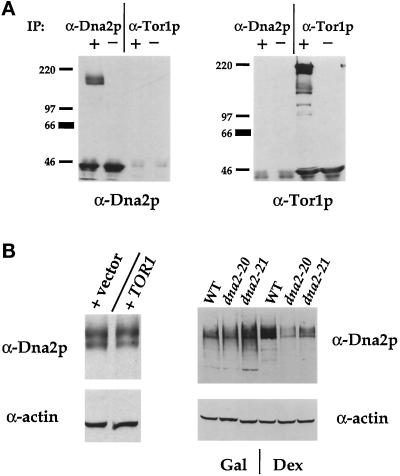Figure 6.
(A) Dna2p and Tor1p do not interact in vitro. Extracts from CB018 transformants were prepared and immunoprecipitations (labeled “IP”) performed with either affinity-purified anti-Dna2p antibodies (α-Dna2p) or 12CA5 (α-Tor1p) ascites. Washed immunoprecipitates were loaded onto 6% SDS-PAGE gels and immunoblotted with either anti-Dna2p (left) or anti-HA (right) antibodies. + and − indicate the presence and absence, respectively, of extract in the immunoprecipitate. (B). Effect of Tor1p overexpression on Dna2p levels. Left panel, strain CB018 was transformed with either PRS315 (vector) or pYDF125 (TOR1), and immunoblots were probed with either affinity-purified anti-Dna2p antibodies or anti-actin antisera. Right panel, strains YMW1(WT), 2–71(dna2–20), and 2–174(dna2–21) were transformed with pYDF77 (GAL1p→TOR1) and grown for 5 h in YPGal and either prepared for extracts (Gal) or shifted to YPD for 9 h (Dex) before preparation of extracts. Equal amounts of protein were loaded onto 8% gels and immunoblots probed with either anti-Dna2p (top) or anti-actin (bottom) antibodies. Protein levels were quantified by densitometry and normalized to actin levels.

